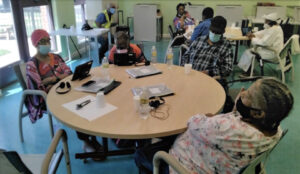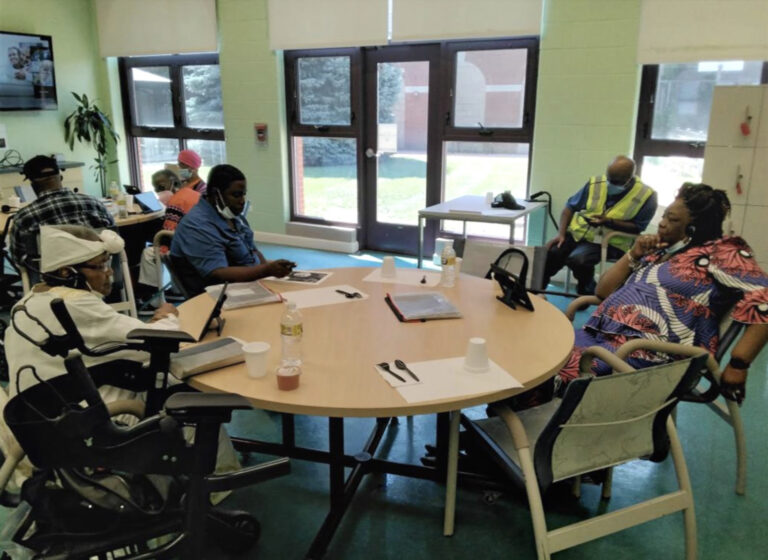With a passion for the empowerment and health of her community, Camille Love always knew that she would thrive in the healthcare field. And today, with more than 16 years of experience under her belt, she continues to search for opportunities where she can lend her expertise in community healthcare. The transition of long-time member Angela Higginbotham from our Board recently created such an opportunity for Camille Love and added to the related expertise of Sage Collective as it pursues ways of encouraging the adoption of healthier lifestyle choices among older adults in underserved communities. We couldn’t be more thrilled to announce Camille Love as the newest addition to the Sage Collective Board of Directors. Get to know Camille in her introduction below:
Can you talk a bit about your professional background and how it has added to your expertise in your field?
I originally started my nursing career when I was very young, around 16, when I decided to become a certified nursing assistant. I’ve never been in any other field besides nursing. From starting as a CNA, to becoming a registered nurse and now a nurse practitioner, I recognize that I have been completely focused for nearly two decades in work that is meaningful and fulfilling every day.
I transitioned into being a nurse practitioner when I felt that I wanted to broaden my scope of work. And now, I’m at a point in my career where I’m ready to take on leadership roles where I can empower and mentor other nurses and healthcare providers.
What should those outside of the healthcare ecosystem know about the community caregiving experience?
Overall, I feel that there are two factors that everyone should keep in mind. On one side, I see the need for more compassion, which I say because we often see people now who have “compassion fatigue”. In general, we all need to show more sympathy and compassion to one another because you never know what others are going through at that moment. They might be a very fatigued healthcare provider, or if they aren’t a healthcare provider, they may be completely isolated.
The second point is to practice safe behaviors. It’s easy to brush little things off of your shoulder when they might not affect you, but try to keep in mind that your actions could, in turn, affect someone else. If you’re possibly exposed to something like COVID-19, be considerate and make the smart decision to stay home and wear a mask so you don’t accidentally expose anyone else.
Sage Collective believes that a sense of ‘care for the collective’ is essential for not only individual health but the health of a community. How does this belief translate through your own work and past experiences?
My experience has taught me that the health literacy of those outside of healthcare is very low, and I feel that if we did a better job of communicating within our communities, that simple act of just talking to one another lessens the burden of providers and relieves some anxiety for community members. For example, parents need to understand that if their child has a temperature and a runny nose, it’s not something out of the ordinary and often doesn’t require attention from us in the hospital.
If someone in that parent’s family had told them that this level of illness is normal, that would help create literacy in the community. So, in turn, they wouldn’t be burdening the providers to address a set of symptoms, which, in their eyes, is a simple matter.
I also deal with older adults who have chronic illnesses like diabetes. In the African American community, we traditionally go heavy on salt, which leads to high blood pressure and other conditions. In the Latinx community, we have patients whose diets rely on tortillas, beans and other high-carb foods. Communication within these communities is essential when talking about wellness, since it completely changes the game when it comes to the knowledge and decisions people make about their diet. So, if you have a simple conversation amongst family, friends or community members, you could change a whole community’s health based on word of mouth and education. So, the healthcare-focused component of my work completely aligns with the community component that Sage provides.
What other unique values held by Sage Collective have drawn you to join the Board?
I’m currently working for an organization that is a federally-qualified health center, so our objective is to provide excellent quality healthcare to underserved communities. This has always been my mission in healthcare since that population is, well, underserved in nearly every aspect of life. So, working with Sage Collective, I can help populations that are both underserved and overlooked.
Within the Sage ecosystem, you have people of color, and you have the elderly, and then you have people who face financial hardships, so these circumstances are not affording them luxuries that other persons would normally get. My fuel is to always target and give the best to underserved communities, so I was immediately drawn to Sage Collective because of our parallels.
What is the significance of having intergenerational relationships in the healthcare world? Specifically in community health?
Intergenerational relationships are integral to the success of communities. They offer the opportunity to bring together the tried-and-true conventions that exist within the healthcare field with the energy, innovations and new perspectives of younger generations.
What are you most looking forward to as a new member of Sage Collective’s board?
I’m very excited to be working with the other leaders on the Sage Collective Board, and to have the opportunity to learn from them, pick their brains, and of course, contribute to the organization itself. I’m also eager to serve and have the opportunity to continue the work that has inspired me for so long, but in a different capacity, through housing and programming.












